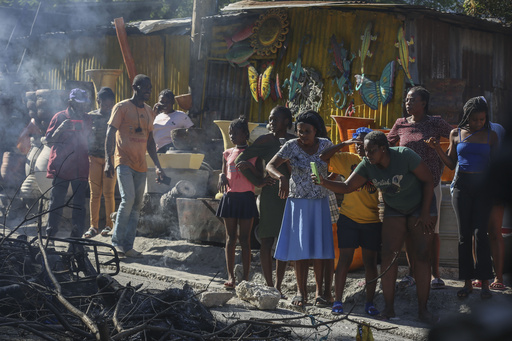
Russia and China have expressed their opposition to a U.S.-initiated effort aimed at converting the Kenya-led multinational force in Haiti into a U.N. peacekeeping mission. This joint stance arose during a U.N. Security Council session, which was convened against the backdrop of increasing gang violence in Haiti. Notably, attacks on four aircraft have led to the closure of the airport in Port-au-Prince, while upscale neighborhoods like Petionville have also come under fire. Current estimates suggest that gangs wield control over about 85% of the capital and are infiltrating surrounding regions.
The proposal for a U.N. peacekeeping force was introduced by the U.S. in early September, primarily as a solution to secure ongoing financing for the multinational force that is currently facing a significant funding shortage. Despite the U.S. efforts to secure approval from the 15-member U.N. Security Council last week for a draft resolution that would facilitate this transition, both Russia and China declined to engage in discussions regarding the resolution. Instead, they used the Security Council meeting to articulate their objections.
Deputy U.N. Ambassador from China, Geng Shuang, pointed out that just a month ago, the council renewed the mandate for the existing multinational force, arguing that shifting to a peacekeeping framework now would likely complicate efforts to address funding issues and garner the necessary police support for Haiti. Geng emphasized that deploying peacekeepers is only sensible in contexts where peace already exists, which is not the case in Haiti at present. He stated, “Placing peacekeepers into the frontline against gangs at this moment is simply untenable.”
Originally, the multinational force aimed to have 2,500 international police on the ground; however, the U.N.’s political mission head in Haiti, Maria Isabel Salvador, indicated recently that only about 430 police are currently deployed—predominantly from Kenya, along with small detachments from the Bahamas, Belize, and Jamaica. She highlighted the severe lack of resources in the U.N. trust fund that finances the multinational force, which has thus far received $85.3 million from the pledged $96.8 million. Although the U.S. pledged $300 million toward this effort, the required funding to maintain a fully staffed deployment is estimated at $600 million annually.
Russia’s Deputy U.N. Ambassador, Dmitry Polyansky, voiced his dismay at the situation in Port-au-Prince, attributing responsibility to countries that initially endorsed the multinational force but have now failed to provide adequate funding. He argued that Haiti’s current conditions do not warrant the presence of U.N. peacekeepers, as they are designed to sustain peace rather than combat urban crime or address the complexities of a fragile state engulfed in conflict.
Regardless of the nature of future international efforts in Haiti, Polyansky underscored the immediate need for humanitarian assistance, advocating for the multinational force to receive essential resources, funding, and expertise. He cautioned that without prompt action, Haiti may become an inhospitable environment for any future peacekeepers.
Haiti’s leadership has formally requested a U.N. peacekeeping force, with the Organization of American States dating back to mid-November having supported this request. At the recent council meeting, there was notable backing for the proposed transformation of the multinational force.
Monica Juma, Kenya’s national security adviser, informed the council that previous joint initiatives between the multinational force and Haitian police have been successful in safeguarding critical infrastructures such as the police academy and national palace. However, she stressed the necessity for an urgent increase in support for the force and expressed Kenya’s eagerness for additional deployments and contributions of resources.
Meanwhile, U.S. Deputy Ambassador Dorothy Shea called for action from the Security Council, stating that the time has come to begin addressing Haiti’s security needs with the support of Haitian and regional stakeholders.
The most compelling plea for peacekeeping assistance came from Dr. Bill Pape, a Haitian physician and educator who recently departed Port-au-Prince. He conveyed to the council that the current armed forces and police in Haiti are severely undermanned and outgunned. Despite acknowledging the past failures of foreign missions in Haiti, including allegations of misconduct and a cholera outbreak that claimed 10,000 lives, Pape underscored that the levels of insecurity now are unprecedented. “I sincerely hope my request for your support to restore security is not excessive,” he stated, adding, “The situation demands that we consider the presence of international forces, as there appears to be no viable alternative.”
